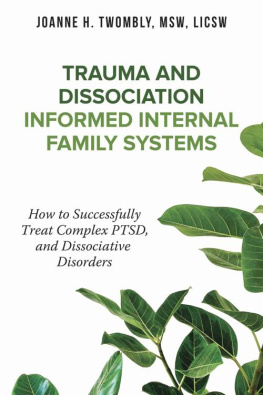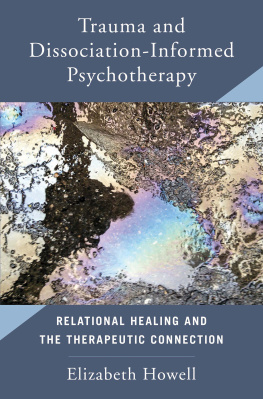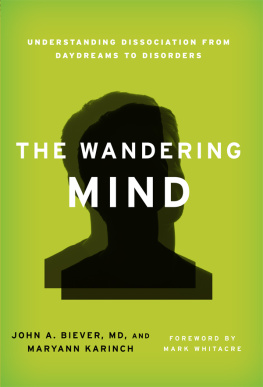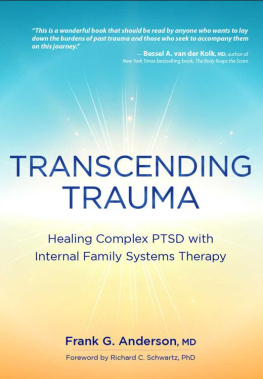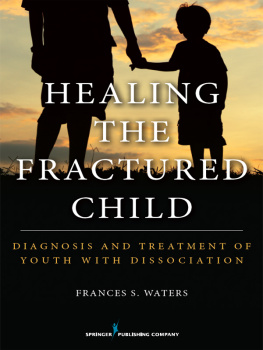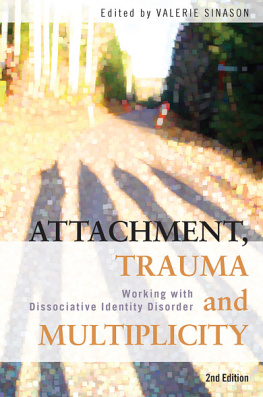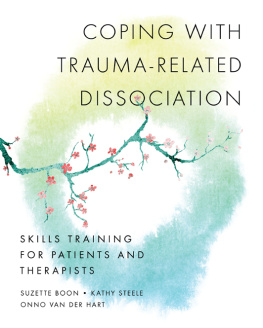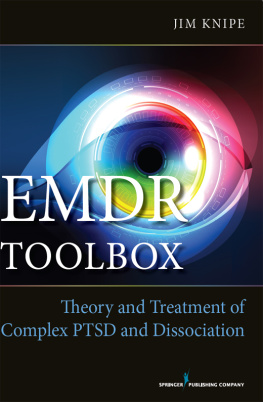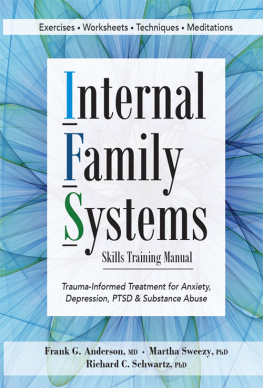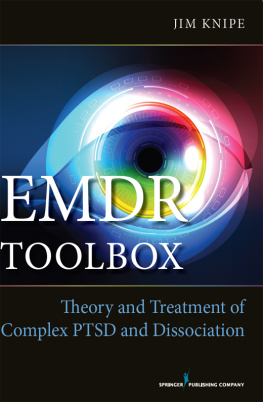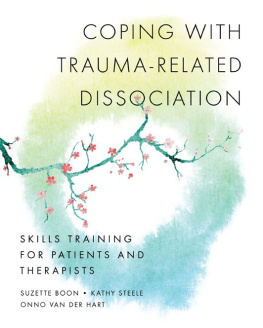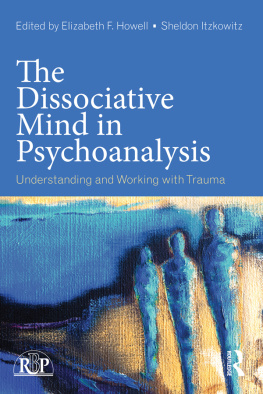Praise For Trauma and Dissociation Informed Internal Family Systems
This is a lovely, highly accessible and informative book for therapists who use the Internal Family Systems model of treatment. Those of us who have worked for many decades in the field of complex trauma and dissociation have become accustomed to the idea of needing psychotherapy approaches plus specialized understanding and knowledge about treating dissociation. Joanne Twombly has masterfully combined IFS and the basic tenets of treating clients with dissociative disorders, emphasizing that ego state parts and dissociative parts require somewhat different, if complementary, approaches. She offers pragmatic modifications of IFS to fit for more dissociative clients. IFS therapists will find a wealth of practical information illustrated by a variety of case examples. A must read!
Kathy Steele, MN, CS
Winner of 2017 Pierre Janet writing Award from the International Society for the Study of Trauma and Dissociation
This book is the missing link to integrating IFS with the treatment of complex trauma and dissociative disorders. It is needed on every IFS therapists bookshelf!
IFS Certified Therapist and Client
This long-awaited book is for clinicians both as teacher and learner who are trained in Internal Family Systems (IFS), Voice Dialogue (VD), and other models of ego state psychotherapy and wish to enhance their competency to treat patients/clients with complex trauma and dissociative disorders. Joanne Twombly, by brilliantly demonstrating the use of basic IFS skills in concert with those skills from the world of complex trauma and dissociation, has provided new pathways for therapists to reduce their own stress while safely facilitating deep healing in clients/patients who mentally dissociate and develop high levels of anxiety and self-destructive behaviors even during treatment. Digesting these clearly written pages guides all therapists to integrate the evidence-based concepts and methods of subpersonality with those of EMDR, nonverbal and hypnotic communication, psychopharmacology, and psychodynamic countertransference. Twombly has provided a valuable resource for those who have the wish and courage to work with emotionally and physically traumatized children and adults.
John Livingstone, MD
Life Member of the American Academy of Child and Adolescent Psychiatry
Assistant Clinical Professor of Psychiatry, McLean Hospital
Joanne Twomblys book is the missing piece of the puzzle in treating dissociative disorders. Her book is an invaluable guide for clinicians applying specific therapeutic modalities to work with patients who have complex trauma histories and/or dissociative disorders. Although attachment and parts work modalities such as IFS, Somatic Experiencing, Sensorimotor Psychotherapy, AEDP, have much to offer treatment of complex trauma and dissociative disorders, none is truly sufficient to navigate the complexities of a deeply fractured inner landscape. Joanne Twombly draws on decades of experience working with dissociative disorders to offer hard won wisdom and practical interventions to provide an essential tool for all trauma clinicians.
Kari Gleiser, Ph.D.
Senior Faculty Accelerated Experiential Dynamic Psychotherapy (AEDP) Institute
Trauma and Dissociation Informed Internal Family Systems
How to Successfully Treat Complex PTSD and Dissociative Disorders
Joanne H. Twombly, MSW, LICSW
Trauma and Dissociation: Informed Internal Family Systems
Copyright 2022 by Joanne H. Twombly, MSW, LICSW . All rights reserved.
No part of this publication may be reproduced, stored in a retrieval system or transmitted in any way by any means, electronic, mechanical, photocopy, recording or otherwise without the prior permission of the author except as provided by USA copyright law.
Adobe Caslon Text design by Carol Twombly.
This book is dedicated to every person in the world who has or has had a dissociative disorder. May you find the kind of therapist and healing you need and deserve.
Trauma and Dissociation:
Informed Internal Family Systems
Integrating IFS with the wealth of knowledge from the Complex PTSD and dissociative disorder world is where the power and healing are for clients with C-PTSD and Dissociative Disorders. If your client is getting worse, struggling during the week, and increasingly needs more support from you, the information in this book can help by integrating dimensions into the already excellent framework of standard IFS. You will learn to give your clients a chance to have more safety, control, and choices. They will heal more comprehensively and more efficiently by avoiding problems like increased anxiety, excess difficulty managing during the week, and increased risk of self-destructive behaviors. True, not every client will need the strategies and knowledge in this book, however, its practical to be able to recognize when your clients do need them or simply can heal more efficiently with them. By reading this book you will gain the knowledge of how to treat these clients safely, respectfully, ethically, and successfully.
Want to learn more about how to manage trauma and dissociation? Two free handouts are available on Joannes website: joannetwombly.net
Contents
Acknowledgments
I want to acknowledge:
My many mentors, including: Claire Frederick, MD, Richard Kluft, MD, Kathy Steele, MN, CS, Jim Chu, MD, Anna Salter, PhD, Bethany Brand, PhD., and Harvey Schwartz, PhD. Those of you Ive worked with have made me the therapist I am. All have provided me pivotal workshops, have written pivotal books, and have done so with kindness and expertise.
Thank you, Richard Schwartz, PhD: For the IFS model as I never would have finished writing this book without unblending from the: I cant do this/Im not good enough parts of me!
Special thanks go to Dan Brown, PhD, for help with the chapter on Hypnotic Wording and even more thanks for his impact on my life. I have been blessed to have gotten training and mentoring by him, as have all of us who work with trauma survivors and others. He is one of the people who took on the False Memory Syndrome Foundation and, always ethical and precise, he testified both for therapists who were being attacked and against therapists whose work was substandard. He was a role model during his life and dying process as he spent much of his last years in meditation practice and ensuring his attachment protocols and other works were available online. How do you say goodbye to one of your good introjects? I guess I dont have to because he will always be there in one way or another. RIP Dan.
Special thanks also go to Steve Frankel, PhD, JD for his help on the chapter Premature Terminations, and to John Livingstone, MD for his help with the chapter on Medication. In addition, thanks to Jackson Ravencroft, LICSW, Meg Striepe, PhD, and to Huge Kayma, MSW, PhD, MDIV, and Dip Phil for their help on the Gender, Race and Culture chapter.
Thanks also to my many writing consultants and colleagues: Lara Zielin, Writers Academy, who got me going; Ellaine Ursuy at Self-Publishing School who kept me going, Carol Grace who edited the first draft without whom I may never have managed to write this book, and gotten to my second editor, Corina Douglas at Burning Legacies Publishing, and last but definitely not least, to Paula Stanziani, a professional writer and editor who polished up the final draft. Also, to Carol Ginandes, PhD, Hillary Glick, PhD, Evelyn Gladu, LMHC, and the many other friends and colleagues whove read various versions and helped with encouragement and editing.
And finally, to my clients and the clients of other therapists whose struggles Ive heard about through sessions, consultations and trainings. Treatment modalities dont work by themselves. It is the therapist and the clients work together that shapes and forms how they work. Thus, much of my learning has occurred in the many hours my clients and I have struggled together to understand and work through the horrors of their childhoods of abuse, neglect, and attachment issues along their path to healing. To them, I am grateful and full of admiration. Had I gone through the kinds of childhoods they lived through, I dont know that I would have survived as well as my clients and still had the capacity for love and the strength to strive for healing.
Next page
